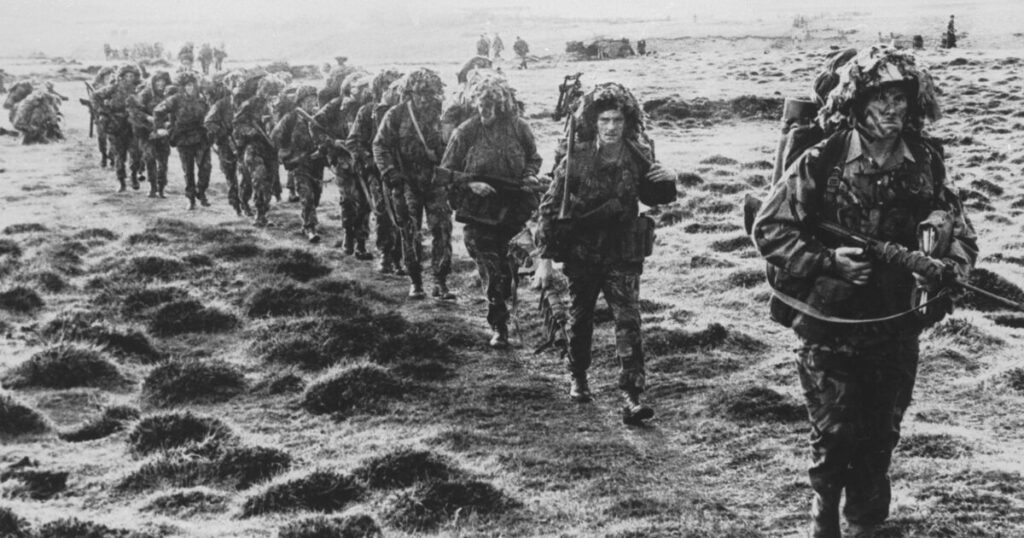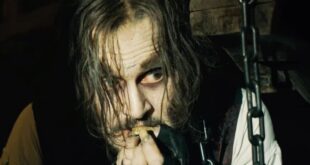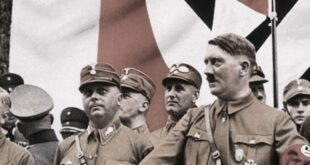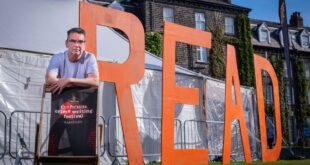

British forces advancing across the Falkland Islands ahead of battle (Image: Getty)
The terrain is harsh, it’s pitch black and the weather is brutal. The Royal Marines are pinned down by heavy and accurate enemy fire. They are 8,000 miles from home, soaking wet, exhausted, outnumbered and about to assault a steep, unforgiving mountain. This was the early stages of the Battle of Mount Harriet, which took place over June 11-12, 1982, amid the Falklands War but is today less well known than other key clashes in the 74-day conflict against Argentina.
Yet while it is perhaps less renowned, the accounts of bravery from the battle remain awe-inspiring and it played a huge part in the final liberation of the islands. In one instance, Corporal Stephen Newland’s troop was pinned down by a sniper and unable to advance, so he decided to do something about it. Newland and a fellow Marine crawled forward to flank the sniper. As they moved, incoming fire crashed into the rocks above them.
Newland had good cover so he kept going. His mate had no such protection and was forced to lie prone. Newland advanced stealthily towards the sniper, but soon realised that this was no lone sniper. There was a whole squad of Argentines – 10 men with automatic rifles and a machine gun. One of them would shoot sporadically, clearly trying to draw his platoon into an ambush. Alone, and unsupported, Cpl Newland knew he had to act.
With a mix of grenades, and sustained fire with his rifle, he took on the whole party – undoubtedly saving many British lives and suffering severe gunshot wounds to the legs during the process. For this, Cpl Newland was awarded the Military Medal. Yet this encounter was just one instance of extreme bravery that took place during the Battle of Mount Harriet 43 years ago today on the remote archipelago.
Don’t miss…
It was tragic and terrifying but it gave Britain back national pride
One Way Street: Chilling story of a war veteran who witnesses murder
Spin forward six years, and picture me. Stood at the foot of Mount Harriet, marvelling at the extreme terrain, and at the bravery of Cpl Newland and many others. It lit a fire within me that has never dimmed. A couple of years ago, I was talking to an editor friend, who suggested a new book he thought I ought to try and write.
Now firstly, I’m a police procedural novelist. I’m known for writing my Max Craigie series of Scottish crime books, all of which feature a small team of anti-corruption cops, working in the shadows to bring the worst of the worst to justice.
They’re fun books to write, and they sell really nicely, but my editor friend had an idea that I should try something else. And when he told me, it lit something inside me. “You should write a book about a group of old villains getting together for one last heist, a bit like the blokes who did the Hatton Garden heist. Right up your street, that.”
I liked the idea, and an idea began to form. I knew one thing, though. I didn’t want to write about villains. As an ex-specialist crime detective, who worked for the Met Police for a quarter of a century I find the deification of career criminals a little distasteful. There’s no honour in being an armed robber. Armed robbers terrify the life out of victims, and yet somehow end up being lauded in criminal circles. I’ve no idea how, but they are afforded a “respect” (note the quotation marks) that I don’t believe they deserve. So, I’m much happier chasing villains, than painting them as Robin Hood characters that they almost never are.
Right, I still want to write about some ageing guys having one last caper. So, what then? Then it hit me. The Falklands War and the Battle of Mount Harriet. The incredible invasion, and retaking of that archipelago in the South Atlantic, 8,000 miles away. I was 16 at the time and followed it as closely as I could.

The from the Mount Harriet, the scene of heavy fighting 43 years ago (Image: AFP via Getty)
There was no rolling news or social media in 1982 (apart from Ceefax). However, I was glued to TV news, and devoured every article in the newspapers. I also had a couple of acquaintances who were Royal Marines deployed, one of whom was injured at Ajax Bay, which only increased my obsession.
In 1983, I also joined the armed forces as a military policeman, and in 1988, I was deployed to the Falklands where I worked for four months as a military dog handler, patrolling high value areas of RAF Mount Pleasant, and wider into the Island.
It was a fascinating place. Bleak, wild, beautiful and treacherous. I remember standing at the foot of Mount Harriet and looking up, and the terrain was just so harsh that I had a new found respect for the Royal Marine commandos who had assaulted it and defeated the Argentinian defenders.
Almost 40 years later, I also watched a TV show called Our Falklands War, A Frontline Story on BBC iPlayer. This was a fascinating show aired on the 40th anniversary of the conflict. The narrative was from the point of view of a group of veteran Marines, Paratroopers, Guardsman, and Engineers – all of whom were recounting their experiences publicly for the first time.
It was utterly fascinating. These guys were by now all in their 60s. Some had fared well, others had unsurprisingly struggled with PTSD, bearing in mind what they’d experienced, but what struck me was just how formidable many of them seemed. Big, tough, hard-nosed men, clearly with aching limbs, but still with that wry humour that I’ve come to expect from servicemen. Also, what was clear was their commitment to their comrades, the sorrow at the losses, and the reflections on the conflict.
It made my decision for me. I had my plot, and I wrote a pitch to myself for the book. I always do this. Sum up the book in a paragraph, and see if it works. The old unit will reunite to complete one last mission in honour of their fallen comrade. But all she wants is revenge…

British troops landing during the Falklands War (Image: Getty)
When their old comrade, retired veteran and decorated Royal Marine Frankie Chapman, dies during a home invasion, the 11/06 club come back together to recover his stolen military medals.
After they find out the medals have fallen into the hands of a wealthy billionaire who dabbles in human trafficking, they form a plan to steal the medals back – and Frankie’s daughter, Josie, wants in on the action.
But Josie wants more than just her father’s medals returned. She wants retribution, and she’s out for blood. I had it. An old school action thriller. I just had to write it. The 11/06 were called thus, because that was the date for the battle of Mount Harriet, where my heroes had fought together. They’d gone through hell, and a bond had been forged between them that couldn’t be broken. They’d stop at nothing to get Frankie’s medals back for his daughter.
I wanted to use Mount Harriet, as of all the land battles during the few months of the conflict, Mount Harriet is perhaps the one that doesn’t spring to mind amongst the general public.
We tend to remember Goose Green, Mount Longdon, or Mount Tumbledown, but Harriet was of equal importance; it was the scene of a great deal of skill, determination and bravery.
I researched the history of the battle and the bravery shown by 42 Commando, Royal Marines as they assaulted that terrible, harsh terrain in hideous weather, against overwhelming odds. With their customary grit, bravery and determination, the Marines prevailed. Two Royal Marines, Corporal Laurence George Watts and Corporal Jeremy Smith, were killed, and 30 more were wounded, including 14 in L Company alone. Another seven Welsh Guards and Gurkhas were wounded by Argentine artillery and mortar fire controllers on Mount Harriet.

Neil Lancaster as a young military policeman on the Falklands (Image: Courtesy Neil Lancaster)
The Argentinians lost, 18 killed and 300 captured. It was such a display of bravery, in the most arduous conditions that I felt the experiences the Marines underwent would bind them together forever. The bonds that bind those who have served together in difficult times are hard to break.
I had another reason for wanting to feature ex-Marines in my book. My middle son, Richard joined the Royal Marines aged 16.
He endured the longest military training, and was awarded his green beret almost a year later. He still is serving, years later, and is soon to take up a new role at Lima Company, 42 Commando with whom he fought in Afghanistan as a Marine. So, I guess you can understand why I picked this branch of the forces.
Having a close relative in the Marines means that you start to learn something of the ethos and culture, purely by osmosis. The Marines have a distinct language that they use. For instance, “Icers” means cold. “Redders” means hot. “Threaders” means hacked off. Any type of a drink is known as a “wet” and food is “scran”. There are dictionaries out there with big lists of it all. It’s a small thing, but it really seems to perpetuate the culture within the corp.
There’s another thing. For some reason the Marines seem to attract a more diverse and sometimes oddball type of recruit. I remember my son telling me about one of his mates who was ex-public school, from a wealthy family. He guessed this because his pal would write home using a fountain pen. Another one of his comrades when he joined was a guy in his mid-20s, who had a good degree from Loughborough University who had also rowed in the Olympics for Great Britain. It seems to attract all types, from all backgrounds, not just from the traditional areas we see in other branches of the forces.

Iconic shot of 40 Commando Anti-Tank Troop marching towards the enemy (Image: Imperial War Museums via Getty)
All of this is an absolute manna from heaven to a novelist. Humour is an enormous part of the culture in the Marines, and this meant I could authentically inject it into the book. I wanted it to be raw and real, and this was a huge part of it. This was vital, as part of the story is that they’ve all left the services, and gone on to have incredibly varied careers.
One became a successful businessman, one became a senior police officer, another remained in and became the RSM in the SBS, one left and became a career criminal. Four entirely different characters, all with different skills, different attitudes, but all bound together by their experiences 40 years ago, can become much more than the sum of their parts.
It’s the book I’m most proud of, and the dedication at the front of it probably tells you why. It’s No Mercy, and is published under a pseudonym Max Connor, as I wanted to write it independently from my Max Craigie series that I write under my real name. It just felt appropriate that this book should stand on its own two feet.
This book is dedicated with deep respect to those who have worn, or continue to wear the green beret, and who embody the commando values you live by. Courage, determination, unselfishness, and cheerfulness in the face of adversity. The Falklands war is now 43 years ago, but to many of the veterans, it may as well be yesterday. We cannot forget them.
- No Mercy by Max Connor (HarperCollins, £9.99) is out now

Neil Lancaster’s new book, written under the pen name Max Connor, is No Mercy (Image: HarperCollins)
 Latest World Breaking News Online News Portal
Latest World Breaking News Online News Portal






